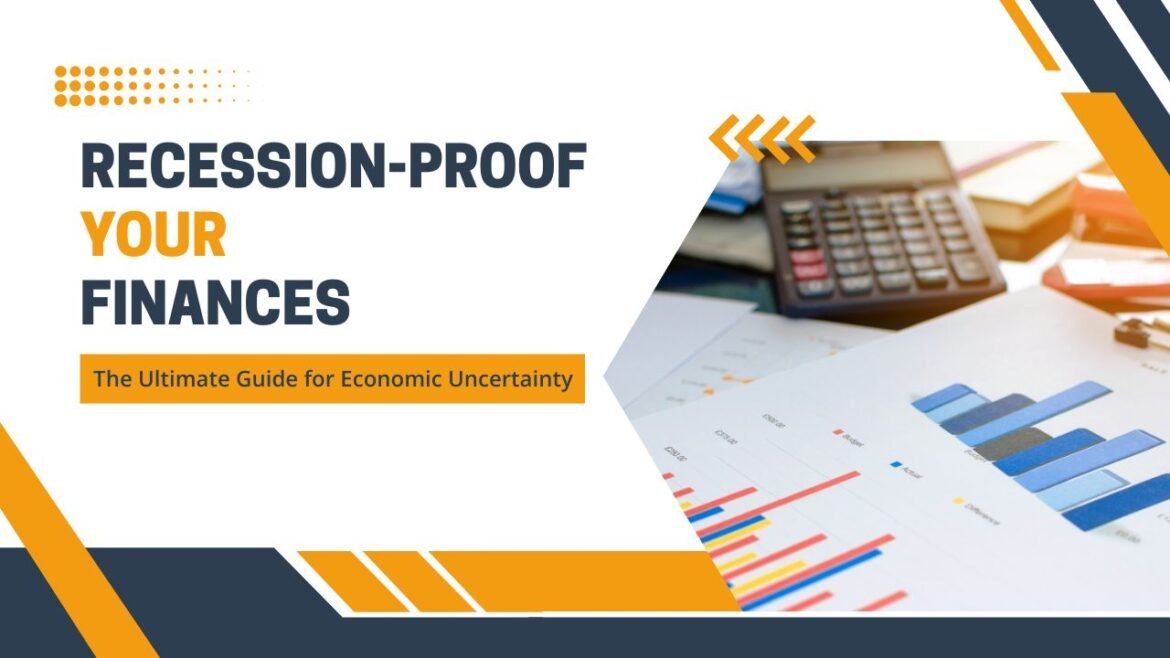The whispers of economic uncertainty are never far from the headlines. Whether it’s inflation, fluctuating interest rates, or global events, the idea of a recession can feel unsettling. For young professionals and families building their financial foundations, understanding how to recession-proof your finances isn’t just smart planning – it’s essential for peace of mind and long-term security.
A recession doesn’t have to spell disaster for your money. In fact, by adopting proactive financial strategies, you can not only weather economic storms but potentially even emerge stronger. The key lies in building a resilient financial framework that can withstand pressure and adapt to changing conditions.
This ultimate guide will provide you with actionable steps to recession-proof your finances, ensuring your hard-earned money remains stable and continues to work for you, even during periods of economic uncertainty. We’ll cover critical areas like budgeting, saving, debt management, and smart investing strategies designed to protect and even grow your wealth.
Understanding Recession-Proofing: More Than Just Cutting Back
Recession-proofing your finances is about creating a buffer and a strategic plan to mitigate the negative impacts of an economic downturn. It’s not just about frugality; it’s about strategic financial resilience.
Key aspects include:
- Liquidity: Having readily available cash.
- Low Debt: Reducing financial obligations.
- Diversified Income: Multiple sources of earnings.
- Defensive Investments: Assets that perform relatively well in downturns.
Pillar 1: Fortify Your Emergency Savings
This is the cornerstone of recession-proofing. An robust emergency fund provides a safety net against job loss, unexpected medical bills, or other financial shocks without resorting to high-interest debt.
- Aim for 6-12 Months of Living Expenses: While 3-6 months is standard advice, aiming for 6-12 months of essential expenses offers a stronger buffer during a recession.
- Keep it Liquid: Store your emergency fund in a high-yield savings account where it’s easily accessible but still earning a decent return. Discover how to maximize your savings Make Your Money Work Harder: A Guide to High-Yield Savings Accounts
- Automate Contributions: Make saving a consistent habit by setting up automatic transfers from your checking account.
Pillar 2: Master Your Budget & Reduce Discretionary Spending
During economic uncertainty, understanding exactly where your money goes is paramount. A disciplined budget helps you identify areas to trim fat.
- Zero-Based Budgeting: Assign every dollar a job. This forces you to be intentional with every expense and prevents money from slipping away.
- Subscription Audit: Go through all your recurring subscriptions (streaming, apps, memberships) and cancel anything you don’t actively use.
- Reduce “Lifestyle Inflation”: Be mindful of how your spending has crept up with your income. Cut back on non-essential “wants” like frequent dining out, expensive coffees, or impulse purchases.
- Explore Cost-Saving Hacks: Look for creative ways to save on groceries, utilities, and transportation. Find practical tips in: 25 Genius Everyday Hacks to Save Money (Without Feeling Deprived!.
Pillar 3: Aggressively Tackle High-Interest Debt
High-interest debt, especially credit card debt, is a severe liability during a recession. It eats into your cash flow and offers no financial upside.
- Prioritize High-Interest Debt: Focus intensely on paying down credit card balances and personal loans. The “debt snowball” or “debt avalanche” methods can be effective. Get a comprehensive plan for debt freedom: Escape the Trap: Your Action Plan to Conquer Credit Card Debt.
- Avoid New Debt: Resist the urge to take on new consumer debt during uncertain times.
- Refinance (if possible): If interest rates drop or your credit improves, consider refinancing high-interest loans to lower your monthly payments.
Pillar 4: Optimize Your Investments for Resilience
Your investment portfolio needs a strategy that considers potential downturns without abandoning long-term growth.
- Diversify Broadly: Ensure your investments are spread across different asset classes (stocks, bonds, real estate), industries, and geographies. Diversification helps cushion blows from specific sectors.
- Focus on Quality & Value: During downturns, strong, financially stable companies with healthy balance sheets and consistent earnings tend to perform better.
- Continue Investing (Dollar-Cost Averaging): Don’t stop investing during a recession. In fact, market downturns present opportunities to buy assets at lower prices. Dollar-cost averaging (investing a fixed amount regularly) reduces risk by buying more when prices are low and less when prices are high.
- Review Your Risk Tolerance: Ensure your portfolio’s risk level aligns with your comfort zone during volatile periods. Start with the basics of investing: Take the Leap: Your Beginner’s Guide to Smart Investing.
- Consider Defensive Assets: While not always exciting, assets like high-quality bonds or specific dividend stocks can offer stability and income during downturns. Learn about income-generating assets: Beyond Growth: Building Income with Dividends & Fixed-Income Investments.
Pillar 5: Enhance Your Income & Career Security
Your ability to earn is your greatest financial asset. Protect and enhance it.
- Skill Up: Invest in learning new skills that are in demand, especially those resilient to economic shifts (e.g., tech, healthcare, essential services).
- Develop Multiple Income Streams: Consider a side hustle to create additional income. This diversification of income can be a lifesaver if your primary job is affected.
- Network Proactively: Maintain professional connections. A strong network can be invaluable for job opportunities or career advice during uncertain times.
Conclusion: Proactive Steps for Financial Peace
Recession-proofing your finances is not about predicting the future; it’s about preparing for any future. By diligently building your emergency fund, optimizing your budget, tackling debt, strategically managing your investments, and enhancing your income security, you create a robust financial fortress.
These proactive steps empower you to face economic uncertainty with confidence, knowing that you have laid the groundwork for financial stability and wealth building, no matter what the economy throws your way. Start implementing these strategies today, and ensure your financial future is resilient and secure.
Discover more from Motive Money
Subscribe to get the latest posts sent to your email.
